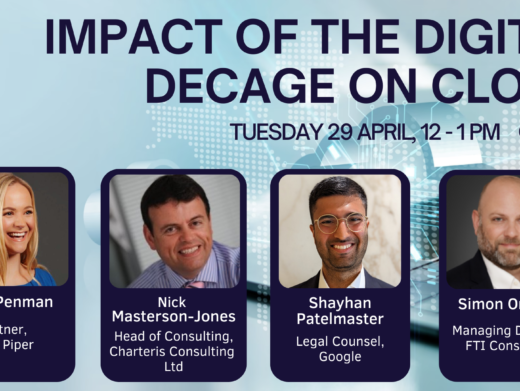{b}From Chris Marsden, Director: EXCCEL (Essex Centre for Comparative and European Law), and Director LL.M. Internet Law (ITME), Director, Undergraduate Admissions, University of Essex. Chris is also author of five books on Internet law, including forthcoming “Regulating Code” (2013, MIT Press with Dr Ian Brown).{/b}
2012 will be a year for longer term perspectives, driven by the desperate state of the Western economies in their fifth year of recession, and the resultant need for substantial belt-tightening by governments, not least in their IT budgets, which will have a radically unpleasant knock-on effect on IT suppliers. In practice, that means moving beyond buying new services that promise (but often fail to deliver) cost savings towards cancelling whole swathes of IT procurement. I would suggest that 2012 will be the year of ‘open data’ (which is free-ish for government to cough up), even more cloud computing (see above), free software finally securing a foothold on desktops in bigger organisations, and most of all for sweating assets such as telecoms contracts, security software, old Windows/Office licences and online databases. Expect Microsoft to react by claiming that Office 2013/14 will be full of Skype connectivity so saving us money.
But then 2011 was not notable for austerity so much as the year of the fondle-slab (iPad) and Jesus-phone (iPhone 4S). So we may march on oblivious! It is always worth checking our previous year to see how wrong we were: I claimed 2010 would be the ‘Year That Three Strikes Strikes Back’ (as I published ‘Network neutrality’), and 2011 ‘Year that the “Three Wise Monkeys” of ISP liability have their eyes well and truly opened by co-regulation’ (as I published ‘Internet Co-regulation’). Naturally I am now claiming a year ahead that 2013 will be about ‘Regulating code’…
{b}From Peter Sommer, Visiting Professor at the London School of Economics, a Visiting Reader at the Open University. Peter has been providing expert evidence involving complex digital evidence for over 15 years. www.pmsommer.com{/b}
Three predictions, all related to issues around digital evidence.
Few outsourcing and cloud services contracts have explicit terms dealing with the supply of digital evidence and fewer still with assisting clients to meet the obligations of e-disclosure. Civil Practice Direction 31B translates the requirements of standard disclosure to Electronically Stored Information; a key test is whether a document is ‘within the parties’ control’. The courts are unlikely to be impressed when a litigant says that although he can access the document for regular business purposes the document itself is not in his control because it is on a third party’s computer, even in another jurisdiction. In the absence of contractual provision, the outsourcer/cloud services entity will be able to charge what they like. We will probably get several unfortunate examples in 2012.
On the criminal side, law enforcement agencies have been quietly and persistently complaining that the Regulation of Investigatory Powers Act 2000, with its difficult-to-interpret definitions of content and communications data, needs radical overhaul. It no longer reflects the range of services on the Internet or the technical methods of investigation the police would like to use. The debate will be a difficult one as, along with their desire for reform, law enforcement will also be nervous of discussing too much about their techniques for fear of alerting their targets. But without such public discussion, parliament and the public will be unable to decide the balance between police powers and controls to prevent abuse.
Also on the criminal side, the reduction by the Legal Services Commission and the Ministry of Justice to hourly rates for experts in computer evidence will make it more difficult for criminal defence lawyers to obtain good quality advice for routine cases. The new scheme maintains the bizarre exaltation of medical evidence over all others with little reference to either the market place or the skills involved. Digital evidence experts will cherry pick and/or migrate to privately funded criminal work and the ever-increasing demands for support in civil litigation.
{b}From Stephen Mason, barrister and author of Electronic Signatures in Law. Stephen is also an Associate Research Fellow at the Institute of Advanced Legal Studies and general editor of Electronic Evidence and International Electronic Evidence.{/b}
I predict that the eCODEX project (http://www.e-codex.eu/) will lead to the compulsory introduction of ‘identity’ cards for all lawyers (and eventually all citizens). If you think that the issue is not within the remit of the EU and subsidiarity governs the introduction of ‘identity’ cards, beware that the word ‘subsidiarity’ has two meanings. If a matter comes within the meaning of ‘subsidiarity’ then the meaning in English is that the Member State makes the decision. However, in Eurospeak, ‘subsidiarity’ means the matter is for the unelected bureaucrats at the European Union. Incidentally, one of the premises that eCODEX is predicated upon is the false statement that ‘there are already about 10 million people currently involved in cross-border civil proceedings’ (FAQs: http://www.e-codex.eu/index.php/faq). This is explained in footnote 4 in the editorial to volume 8 of the Digital Evidence and Electronic Signature Law Review http://wwww.deaeslr.org/2011.html.




